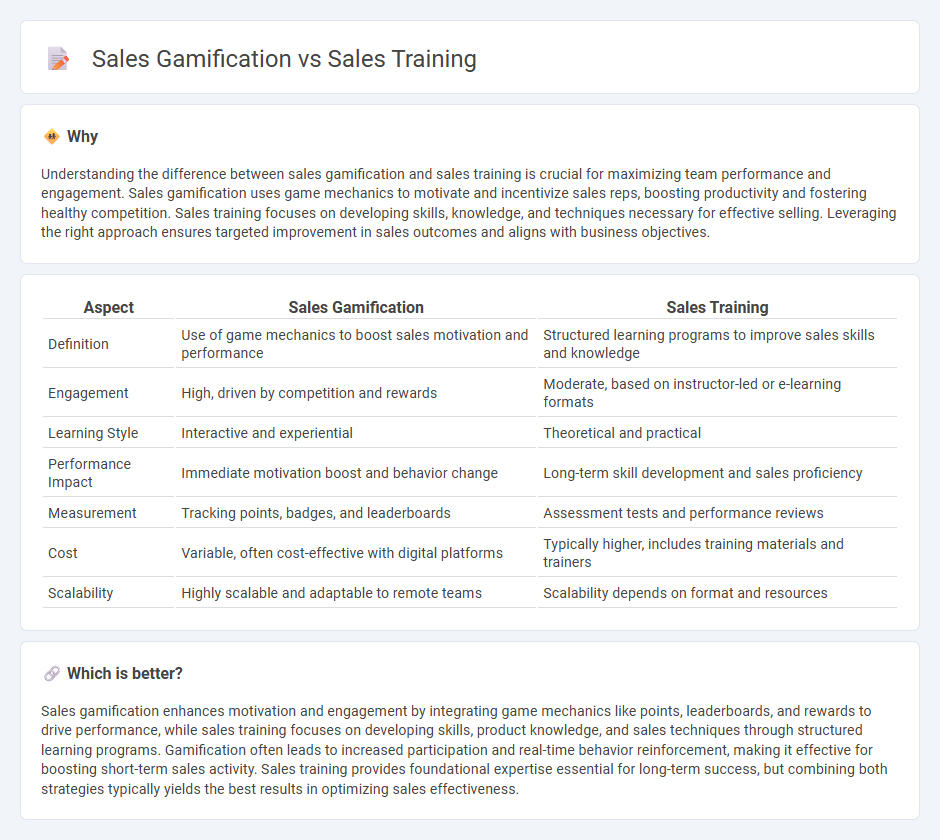
Sales gamification integrates game mechanics into the sales process to boost motivation, engagement, and performance among sales teams. Sales training focuses on developing essential skills, product knowledge, and strategies to improve sales effectiveness and customer interactions. Explore the distinct benefits of combining gamification with traditional sales training to maximize results.
Why it is important
Understanding the difference between sales gamification and sales training is crucial for maximizing team performance and engagement. Sales gamification uses game mechanics to motivate and incentivize sales reps, boosting productivity and fostering healthy competition. Sales training focuses on developing skills, knowledge, and techniques necessary for effective selling. Leveraging the right approach ensures targeted improvement in sales outcomes and aligns with business objectives.
Comparison Table
| Aspect | Sales Gamification | Sales Training |
|---|---|---|
| Definition | Use of game mechanics to boost sales motivation and performance | Structured learning programs to improve sales skills and knowledge |
| Engagement | High, driven by competition and rewards | Moderate, based on instructor-led or e-learning formats |
| Learning Style | Interactive and experiential | Theoretical and practical |
| Performance Impact | Immediate motivation boost and behavior change | Long-term skill development and sales proficiency |
| Measurement | Tracking points, badges, and leaderboards | Assessment tests and performance reviews |
| Cost | Variable, often cost-effective with digital platforms | Typically higher, includes training materials and trainers |
| Scalability | Highly scalable and adaptable to remote teams | Scalability depends on format and resources |
Which is better?
Sales gamification enhances motivation and engagement by integrating game mechanics like points, leaderboards, and rewards to drive performance, while sales training focuses on developing skills, product knowledge, and sales techniques through structured learning programs. Gamification often leads to increased participation and real-time behavior reinforcement, making it effective for boosting short-term sales activity. Sales training provides foundational expertise essential for long-term success, but combining both strategies typically yields the best results in optimizing sales effectiveness.
Connection
Sales gamification enhances sales training by incorporating interactive, game-like elements that increase engagement and motivation among sales teams. By leveraging real-time feedback, leaderboards, and rewards, gamification drives skill development and healthy competition, boosting overall performance. This dynamic approach accelerates knowledge retention and application, directly improving sales outcomes and team productivity.
Key Terms
**Sales Training:**
Sales training equips sales teams with essential skills, product knowledge, and effective communication techniques to improve performance and close deals efficiently. It often involves structured programs, workshops, and role-playing scenarios designed to enhance selling strategies and customer engagement. Explore how tailored sales training can transform your team's capabilities and drive revenue growth.
Skill Development
Sales training emphasizes comprehensive skill development through targeted workshops, role-playing, and real-world simulations to enhance product knowledge, communication, and closing techniques. Sales gamification integrates game design elements such as leaderboards, rewards, and challenges to motivate engagement and reinforce learning by transforming skill acquisition into an interactive experience. Explore the benefits and best practices of both approaches to elevate your sales team's performance effectively.
Role-Playing
Sales training emphasizes skill development through structured sessions, including role-playing scenarios designed to simulate real customer interactions and improve communication techniques. Sales gamification integrates game mechanics into the training process, using role-playing as interactive challenges that boost motivation, engagement, and retention of sales concepts. Explore how combining role-playing in both methods can enhance sales performance and team dynamics.
Source and External Links
11 Effective Sales Training Topics To Help a Sales Team | Indeed.com - Covers essential topics like building rapport, handling objections, and closing sales, with practical tips for tailoring training to team needs and leveraging customer feedback.
Professional Sales Skills Training Programs - Dale Carnegie Training - Offers live online courses on cold calling, cross and up selling, and compelling sales presentations, focusing on modern techniques and confidence-building for sales professionals.
20 Best Sales Training Companies Programs & Courses 2025 - Lists top sales training providers, including classroom and virtual options, with programs ranging from half-day masterclasses to multi-day negotiation training, and highlights measurable business impact.
 dowidth.com
dowidth.com